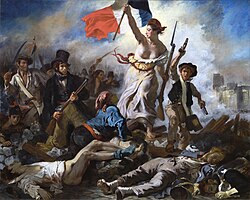
Back مقاطعة (عقاب) Arabic Boykot Azerbaijani Байкот Byelorussian Байкот BE-X-OLD Bèkot BEW Бойкот Bulgarian বর্জন Bengali/Bangla Бойкот BXR Boicot Catalan Бойкот CE
| Part of a series on |
| Political revolution |
|---|
 |
|
|
A boycott is an act of nonviolent, voluntary abstention from a product, person, organization, or country as an expression of protest. It is usually for moral, social, political, or environmental reasons. The purpose of a boycott is to inflict some economic loss on the target, or to indicate a moral outrage, usually to try to compel the target to alter an objectionable behavior.
The word is named after Captain Charles Boycott, agent of an absentee landlord in Ireland, against whom the tactic was successfully employed after a suggestion by Irish nationalist leader Charles Stewart Parnell and his Irish Land League in 1880.
Sometimes, a boycott can be a form of consumer activism, sometimes called moral purchasing. When a similar practice is legislated by a national government, it is known as a sanction. Frequently, however, the threat of boycotting a business is an empty threat, with no significant effect on sales.[1]
- ^ Chang, Andrea (2021-05-09). "Patagonia shows corporate activism is simpler than it looks". Los Angeles Times. Archived from the original on 2021-05-09. Retrieved 2021-05-10.